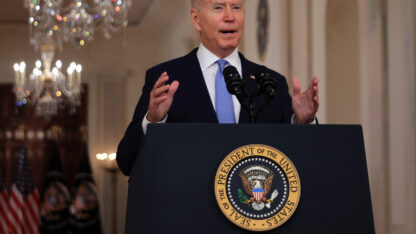Is it bad enough to call it a feud? Maybe not yet, but tension between Georgia Gov. Brian Kemp and House Speaker David Ralston is becoming one of the defining features in the young 2020 session of Georgia’s General Assembly.
The conflict between the Republican officials flared again Wednesday, with Ralston telling reporters that House members are still unhappy with the budget information they’re getting from the Kemp administration. Earlier, lawmakers were miffed when Kemp told agency heads not to appear before legislative committees last summer after he announced budget cuts.
“We started asking for this information as far back as last September and were assured that we would have it, and frankly, some of the information we still don’t have,” Ralston said after he pushed through a weeklong timeout from normal legislative business. He wants House members to focus intensely on Kemp’s proposed budget cuts amid a revenue slowdown — cuts that are getting clear pushback from many House Republicans.
Kemp’s spokeswoman fired back Wednesday, criticizing Ralston for attempting to change how Georgia holds special elections. The unsuccessful attempt would likely have boosted the U.S. Senate bid of Doug Collins, a Ralston friend, and undercut Kemp’s appointed choice, Kelly Loeffler.
“While we respect the Legislature’s purview, the governor does not need a lesson in conservatism from a man who brokered a deal with Democrats just last week for political gamesmanship,” Candice Broce said in a statement.
Tension between a governor and legislators is nothing new — indeed it’s designed into the system. Gov. Sonny Perdue vetoed a 2007 budget when House Speaker Glenn Richardson was trying to force through property tax relief, and then vetoed 40 other bills, including 29 by members of the House Appropriations Committee. Lawmakers are also inclined to fight among themselves. When Zell Miller led the Senate as lieutenant governor and Tom Murphy was House speaker, their feuding was notorious.
By contrast, former Gov. Nathan Deal, Ralston and Lt. Gov. Casey Cagle kept their conflicts to a minimum, in part because Deal coordinated tightly with lawmakers.
“It was the Deal years that were the outlier; this is more normal,” said Brian Robinson, a Republican political adviser who served as communications director for Deal. “It’s normal for legislators to defend their budgetary turf. It’s normal for legislators to use the governor’s priorities as leverage to get what they want.”
Ralston himself has said news reporters have “inflated” the rift.
“You know we don’t agree all the time, nobody agrees with me all the time. I wish I could find somebody that did,” Ralston said last week after having breakfast with Kemp. “But no there’s no tension. I mean we do look at the budget differently on some items. I think that’s healthy.”
But the consequences of those conflicting outlooks are not yet clear. Ralston, a Blue Ridge Republican, is the most vocal proponent of a further income tax cut proposal that gets a cool reception from Kemp. Dropping Georgia’s top income tax rate from 5.75% to 5.5% is projected to cost more than $500 million — and drooping income tax receipts after a similar cut in 2019 are driving Georgia’s current budgetary struggles.
The governor, meanwhile, is pushing a $2,000 teacher pay raise — but Ralston last week said it “was not a commitment that I made.” A raise for K-12 and preschool teachers, projected to cost $376 million, would complete Kemp’s campaign promise of a $5,000 raise.
“Those aren’t marginal issues,” Robinson said. “They are two issues with massive budget implications.”
Underlying all the conflicts is electoral politics. It’s an election year for the 236 members General Assembly members, with Democrats aiming to take back a majority in the House and dethrone Ralston. Plus there’s the U.S. Senate special election to replace the retired Johnny Isakson, with Kemp backing Loeffler despite Ralston and some other Republicans clearly preferring Collins.
Each fight over policy could have implications in any or all of those races — a dynamic that’s unlikely to escape the attention of anyone under the Gold Dome.








